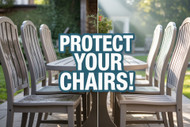How to Care for Your Outdoor Dining Chairs in Atlanta’s Humid Weather
Aug 23rd 2025
Outdoor furniture can be vulnerable to damage from pests and insects, which can affect both its appearance and durability. This blog explores practical strategies to prevent infestations, maintain cleanliness, and ensure your dining chairs remain comfortable and long-lasting in any season.
Key Takeaways
- Atlanta’s humid climate requires outdoor dining chairs to be made from weather-resistant materials like teak wood, aluminum, stainless steel, resin wicker, or polywood for optimal durability.
- Routine cleaning and maintenance, including using mild cleaners and protective finishes, are essential to prevent mold, mildew, and damage from humidity and UV exposure.
- Implementing seasonal care strategies and proper storage solutions, such as using breathable covers and conducting regular inspections, can significantly enhance the longevity of outdoor furniture.
Understanding Atlanta's Humid Climate

Living in Atlanta, you’re no stranger to the city’s humid subtropical climate. With summers often sweltering and humidity levels frequently exceeding 70%, the weather conditions can be quite challenging for maintaining outdoor furniture. The year-round ample rainfall further contributes to high moisture levels, which can damage outdoor pieces, leading to mold, mildew, and accelerated wear and tear.
Recognizing these climate challenges helps you choose and maintain weather-resistant materials suitable for Atlanta’s climate, even during severe weather and humidity.
Choosing the Right Materials for Durability

For outdoor dining chairs, choosing weather-resistant materials is crucial for durability in Atlanta’s humid climate. Top materials that endure the elements include:
- Teak wood
- Aluminum
- Stainless steel
- Resin wicker
- Polywood
These best materials and durable materials offer unique benefits, catering to different preferences and aesthetics. Below, we explore the specifics of each material to assist in your decision-making.
Teak Wood Chairs
Teak wood chairs are popular for outdoor furniture because of their natural oils and water-resistant properties. The teak wood grain repels moisture, making it perfect for Atlanta’s humidity. Additionally, teak demands little maintenance, making it a cost-effective long-term choice.
The beauty of natural wood, combined with its durability, makes natural teak furniture a perfect choice for creating elegant and lasting outdoor dining sets and seating areas.
Aluminum and Stainless Steel Chairs
Aluminum and stainless steel chairs are great for outdoor use because of their corrosion resistance and low maintenance. Aluminum chairs, protected by powder coating, resist oxidation and corrosion, ideal for humid conditions. Stainless steel offers strength and durability, withstanding harsh weather and keeping your dining sets sturdy and attractive.
Both materials require minimal maintenance, making them perfect for busy homeowners.
Resin Wicker and Polywood Chairs
Resin wicker and polywood chairs are built to withstand humidity and temperature fluctuations, offering high durability. Resin wicker is stronger and more element-resistant than natural wicker, while polywood provides the look of natural wood without the maintenance hassles.
These weather-resistant materials offer the perfect blend of style and functionality, enhancing your outdoor living experience in Atlanta.
Routine Cleaning Techniques
Keeping your outdoor dining chairs in top condition, especially in humid climates, requires regular cleaning. Key steps for proper care include:
- Conducting routine inspections and thorough cleanings to prevent dirt and grime buildup, which can damage furniture.
- Using soft-bristle brushes.
- Using mild cleaners.
- Avoiding abrasives.
In the following sections, we will discuss specific cleaning techniques for teak, metal, resin wicker, and polywood furniture.
Cleaning Teak Furniture
Teak furniture needs regular cleaning and sealing to maintain its natural beauty. A mild soap solution and a soft cloth can gently clean teak without causing damage.
Routine maintenance ensures the longevity and aesthetic appeal of your teak outdoor pieces.
Cleaning Metal Furniture
A soft cloth and warm water are enough to clean metal furniture. Regularly wiping it down prevents corrosion and keeps it shiny.
This simple yet effective cleaning routine ensures your metal patio furniture remains in excellent condition for years to come.
Cleaning Resin Wicker and Polywood
For resin wicker and polywood furniture, use a mild detergent and a soft bristle brush. Regular cleaning is necessary to maintain their appearance and durability.
Proper cleaning techniques help preserve the longevity and aesthetic of your outdoor furniture.
Protective Measures Against Weather Conditions

Humidity, rain, and UV exposure pose risks to outdoor furniture in Atlanta, making protective measures crucial for UV protection. Weather-resistant covers and protective finishes can greatly extend the life of your outdoor pieces.
In the following sections, we’ll discuss the importance of furniture covers and applying protective finishes.
Using Furniture Covers
Well-fitted furniture covers prevent water accumulation and offer effective protection. Breathable, weather-resistant covers shield your outdoor dining chairs from heavy rains and UV rays, extending their lifespan.
Applying Protective Finishes
Protective finishes enhance the durability and appearance of outdoor dining chairs. Sealing wood furniture guards against water damage, warping, and cracking, making it an essential care step.
Reapplying protective finishes annually or as recommended ensures long-lasting extra protection against environmental factors and enhance durability.
Seasonal Maintenance Tips

Year-round care is necessary for maintaining outdoor dining chairs, with specific tips for each season. A regular maintenance schedule, including routine inspections and deep cleaning, is vital in Atlanta’s humid climate. Discover effective ways to protect outdoor dining chairs from pests and insects by focusing on preventive care. Regular cleaning, using breathable furniture covers, and selecting pest-resistant materials can help reduce infestations. Incorporating natural repellents and maintaining a tidy outdoor space further ensures your chairs remain clean, comfortable, and ready for use year-round.
In the following sections, we will provide detailed maintenance tips for various seasons: spring, summer, fall, and winter.
Spring and Summer Care
In the humid summers, regular inspections are crucial to ensure the safety and longevity of your outdoor dining chairs. Check for wear or damage at least once a month and clean wooden furniture regularly, ensuring loose screws are tight.
Using breathable covers can protect your furniture from extreme weather conditions and prevent moisture buildup.
Fall and Winter Preparation
With seasonal changes, deep cleaning and applying sealants before winter are essential for preparing wood patio furniture for storage. In winter, use breathable covers and elevate furniture to prevent moisture buildup and damage.
Proper care during fall and winter ensures your furniture remains in excellent condition year-round.
Addressing Common Issues
In humid climates like Atlanta, outdoor furniture often encounters mold, mildew, fading, and moisture absorption. Preventive measures and regular maintenance are key to addressing these issues.
In the following sections, we will discuss solutions for preventing mold and mildew growth, as well as fading and moisture absorption.
Preventing Mold and Mildew Growth
Good air circulation prevents moisture buildup that can cause mold and mildew on outdoor furniture. Moisture-resistant rugs protect against the humid ground, and outdoor-rated fans help maintain airflow.
Using breathable covers during humid months can also help prevent mildew growth on wooden furniture.
Preventing Fading and Moisture Absorption
UV rays can fade wood patio furniture or cause a silver-gray patina, so applying UV-protective products regularly is important. Proper storage, air drying, and protective finishes help prevent fading and moisture absorption, ensuring longevity and visual appeal.
Enhancing Comfort and Style

Personalizing your outdoor dining space showcases your unique tastes and enhances comfort. Adding cushions and creating distinct zones can significantly extend your outdoor living experience.
In the following sections, we’ll explore ways to add cushions and accessories, as well as creating distinct zones in your outdoor space.
Adding Cushions and Accessories
Bright outdoor cushions and soft textiles can turn a simple seating area into an inviting space. Layering different outdoor fabrics, such as bold cushions and decorative pillows, enhances the visual appeal of your patio furniture, adding an extra layer of comfort and style.
Outdoor rugs, throw pillows, and decorative accents are great items to personalize your patios.
Creating Distinct Zones
Distinct zones in your outdoor space enhance functionality and aesthetics, and they can create distinct zones that make all the difference. Furniture arrangement and decorative elements visually separate zones while maintaining a cohesive style.
Integrating plants or lighting helps connect the zones, ensuring a harmonious outdoor design.
Long-Term Care Practices
A consistent care routine and proper storage solutions are vital for the longevity of outdoor furniture. High humidity levels accelerate wear and tear, making regular maintenance crucial.
In the following sections, we’ll discuss a regular maintenance schedule and proper storage solutions for your outdoor dining chairs.
Regular Maintenance Schedule
A monthly inspection routine helps identify early signs of wear or damage in outdoor furniture. Reapplying a protective finish annually maintains the appearance and durability of your wooden furniture.
A regular maintenance schedule ensures your outdoor dining chairs look great and last longer.
Proper Storage Solutions
Indoor storage offers the best protection for outdoor furniture during winter. Allowing furniture to dry completely before storage prevents moisture-related damage.
For long-term storage, avoid tying covers too tightly. Consider climate-controlled storage for valuable pieces.
Final Thoughts
Caring for outdoor dining chairs in Atlanta’s humid climate requires choosing weather-resistant materials, regular cleaning, and protective measures against moisture and UV damage. Seasonal maintenance, addressing mold or fading, and enhancing comfort through cushions and accessories help ensure your furniture remains attractive and long-lasting.
At The Man Cave Store, we provide high-quality outdoor dining chairs in Atlanta, which the homeowners can rely on for durability and style. Our selection features materials designed to withstand the city’s humidity, and we offer expert guidance to help you protect and maintain your furniture year-round.
Frequently Asked Questions
What are the best materials for outdoor dining chairs in humid climates like Atlanta?
Teak wood, aluminum, stainless steel, resin wicker, and polywood are ideal materials for outdoor dining chairs in humid climates like Atlanta, as they offer durability and moisture resistance. Selecting these materials will ensure longevity and comfort in your outdoor space.
How often should I clean my outdoor dining chairs?
You should clean your outdoor dining chairs at least once a month to prevent dirt and grime buildup, with a thorough deep cleaning each season. This maintains their appearance and longevity.
What can I do to prevent mold and mildew on my outdoor furniture?
To effectively prevent mold and mildew on your outdoor furniture, ensure proper air circulation, use moisture-resistant materials, and cover your furniture with breathable covers. This will significantly reduce the risk of mold and mildew formation.
How can I protect my outdoor furniture from fading due to UV rays?
To effectively protect your outdoor furniture from fading due to UV rays, regularly apply UV-protective products and utilize furniture covers. This proactive approach will help maintain the appearance and longevity of your furniture.
What are some tips for storing outdoor furniture during the winter months?
To protect your outdoor furniture during winter, store it indoors if possible and ensure it is completely dry before covering it with breathable materials. For valuable pieces, consider using climate-controlled storage for added protection.

